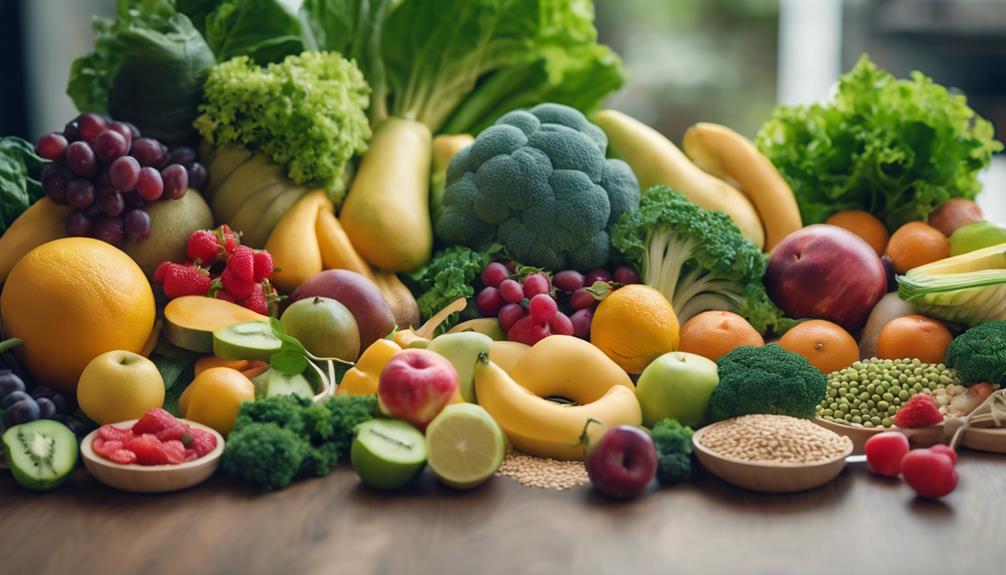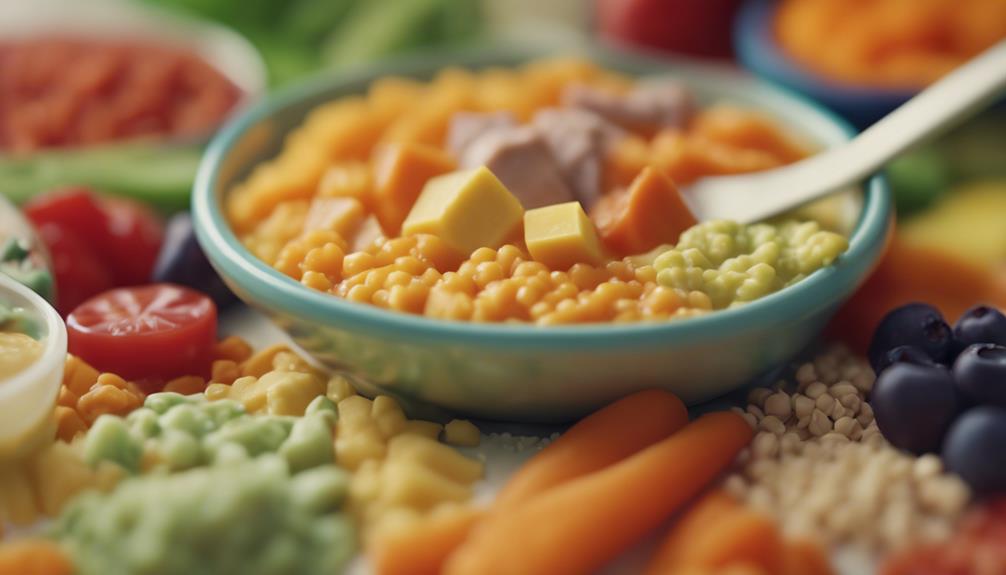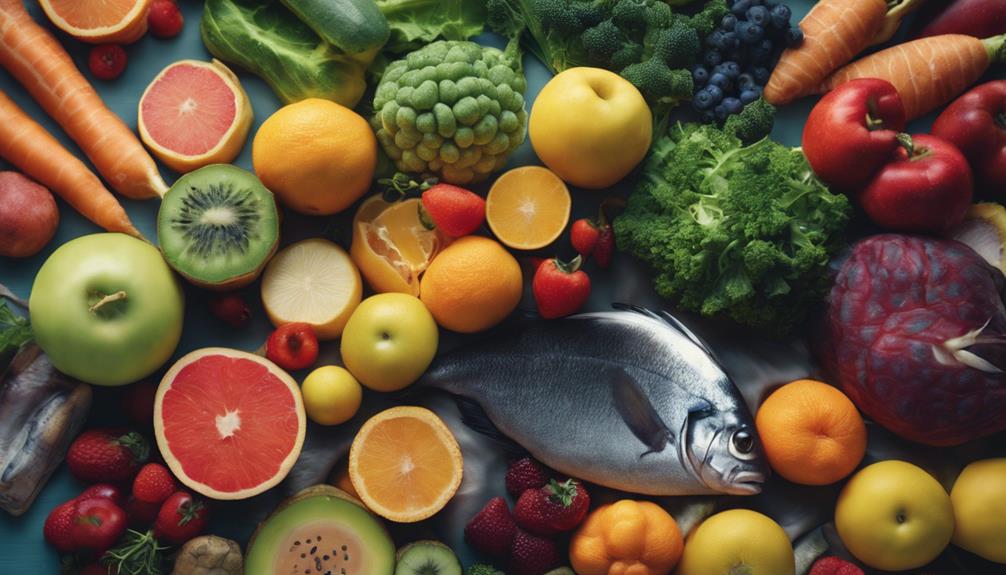To help your baby’s brain development, focus on foods rich in essential nutrients. Eggs are a great source of choline, which is essential for brain growth. Seafood, like salmon, provides omega-3 fatty acids for cognitive function. Leafy greens, such as spinach, offer iron and folate for better cognition. Lean meats like beef supply needed iron for brain health. Yogurt with iodine aids brain development as well. Including these foods in your child’s diet can help establish a strong foundation for cognitive growth and function. Remember, a well-rounded diet is crucial for nurturing your baby’s developing brain.
Key Takeaways
- Eggs are rich in choline, vital for brain development.
- Seafood, especially low-mercury options, supports cognitive function.
- Leafy greens provide iron and folate for brain health.
- Beans, legumes, nuts, and seeds are essential for brain growth.
- Yogurt, with probiotics and B12, boosts brain development.
Essential Nutrients for Baby Brain Development
To promote your baby's brain development, make sure they receive essential nutrients like choline, iron, folate, iodine, and omega-3 fatty acids from various foods.
Choline, found in foods like eggs, is important for brain development.
Iron, which can be sourced from lean beef, plays a significant role in hippocampus development.
Leafy green vegetables, rich in folate, have been linked to better cognition in babies.
Yogurt is an excellent source of iodine, which is essential for brain development and supports cognitive function.
Seafood such as salmon and shrimp offer essential nutrients like omega-3 fatty acids that are beneficial for brain health.
By incorporating a variety of these nutrient-rich foods into your baby's diet, you can help support their brain development and overall cognitive function.
Remember to consult with your pediatrician for guidance on the best foods and portions for your baby's specific needs.
The Power of Eggs

Eggs, a powerhouse of choline, play a crucial role in supporting your baby's brain development and cognitive function. Choline, found abundantly in eggs, is a critical nutrient that enhances memory development and overall cognitive function in babies and toddlers.
Just two whole eggs a day can provide sufficient choline for children under 8 years old, promoting healthy brain growth. The nutrients present in eggs are essential for fetal brain development and can lead to improved cognitive function as your child grows.
By incorporating eggs into your child's diet, you can greatly contribute to their brain health and development. Whether scrambled, boiled, or in a tasty omelette, eggs are a versatile and nutritious option to boost your little one's brainpower.
Seafood for Brain Boost
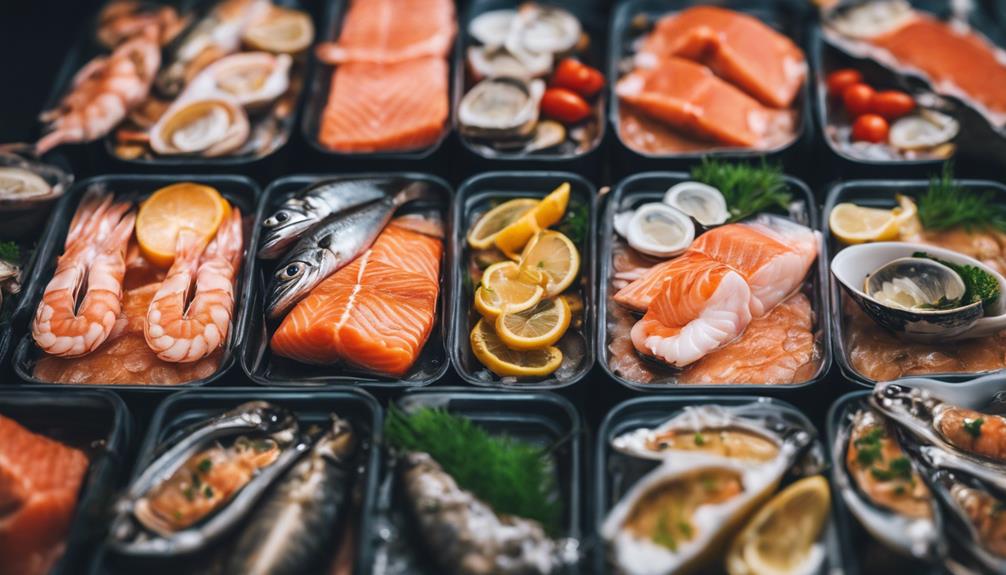
Seafood offers a powerful brain boost for your little one. Omega-3 fatty acids found in seafood support cognitive function, while nutrients like protein and choline aid in brain development.
Be mindful of mercury levels in seafood choices and strive for variety to guarantee a balanced and brain-healthy diet for your child.
Omega-3 for Cognition
Enhance your child's cognitive development by incorporating omega-3 rich seafood into their diet for a brain boost. Omega-3 fatty acids, particularly DHA found in seafood like salmon and tuna, play an important role in brain function.
Here are three key reasons why seafood is beneficial for cognition:
- Improved Brain Development: Omega-3 fatty acids are essential for brain development in children, aiding in the growth and functioning of the brain.
- Enhanced Memory: Consuming seafood rich in omega-3 fatty acids supports better communication between brain cells, leading to improved memory retention and recall.
- Higher Intelligence: Research suggests that DHA, a type of omega-3 found in seafood, is linked to higher intelligence levels and a reduced risk of developmental issues in children.
Mercury Concerns in Seafood
When selecting seafood for your child's brain development, it's important to be mindful of mercury levels to guarantee their safety and well-being. Mercury concerns in seafood can be managed by opting for low-mercury options such as shrimp, salmon, tilapia, crab, or cod. These choices help reduce mercury exposure, which is essential for young children. It's advisable to limit high-mercury seafood like tuna and swordfish in your baby's or toddler's diet to prevent any potential risks.
For children under 3 years old, serving 1-ounce portions of low-mercury seafood 2-3 times a week is safe and beneficial for their brain development. If you're considering canned options, go for salmon over albacore tuna due to its lower mercury content.
Variety for Balanced Nutrition
To guarantee a balanced nutrition intake for your child's brain boost, incorporating a variety of seafood options rich in essential nutrients is highly recommended. Seafood is a great source of protein, zinc, iron, choline, iodine, and omega-3 fats important for brain development in babies.
Opt for low-mercury options like shrimp, salmon, tilapia, crab, or cod to minimize potential risks. Including seafood 2-3 times a week in your baby's diet can provide essential nutrients for their brain growth. Remember to limit high-mercury seafood like tuna and swordfish for babies under 3 to safeguard their safety.
These sources of iron found in seafood play a significant role in cognitive function, memory development, and overall brain health in babies. By adding a variety of seafood to your child's meals, you can help support their brain development and provide them with the nutrients they need for optimal growth.
Leafy Greens for Little Minds
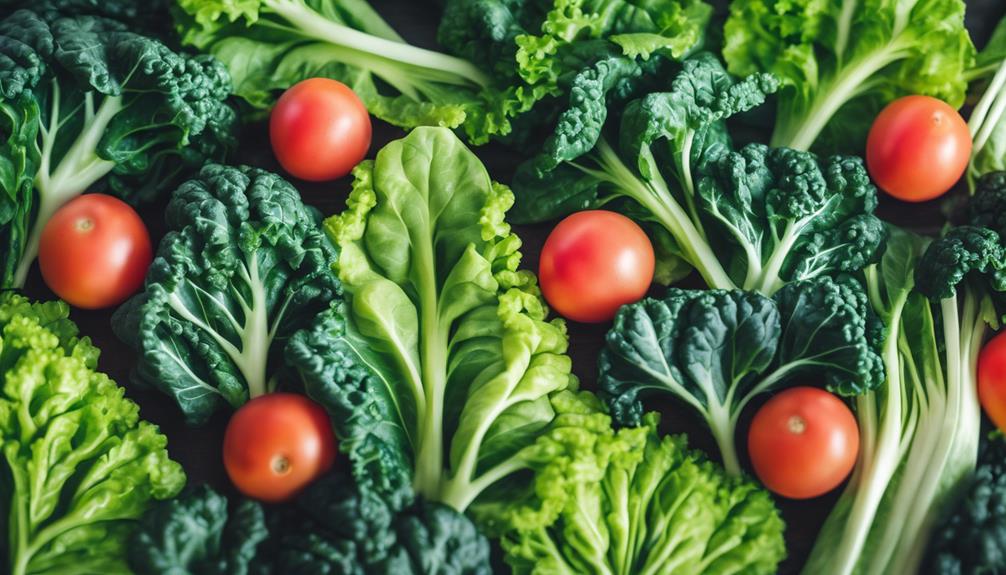
Including leafy greens like spinach, kale, and Swiss chard in your baby's diet can greatly enhance their brain development and cognitive function. These veggies are packed with iron, an essential nutrient for your little one's growing brain. Iron plays a significant role in the development of the hippocampus, an area responsible for memory and learning.
Additionally, leafy greens are rich in folate, which has been linked to improved cognition and brain function in children. By introducing pureed or finely chopped leafy greens into your baby's meals, you can make sure they're getting these crucial nutrients early on. Whether mixed into baby food blends or served as a standalone side dish, leafy greens offer a fantastic way to support your baby's overall brain health and cognitive growth.
Lean Proteins for Growing Brains
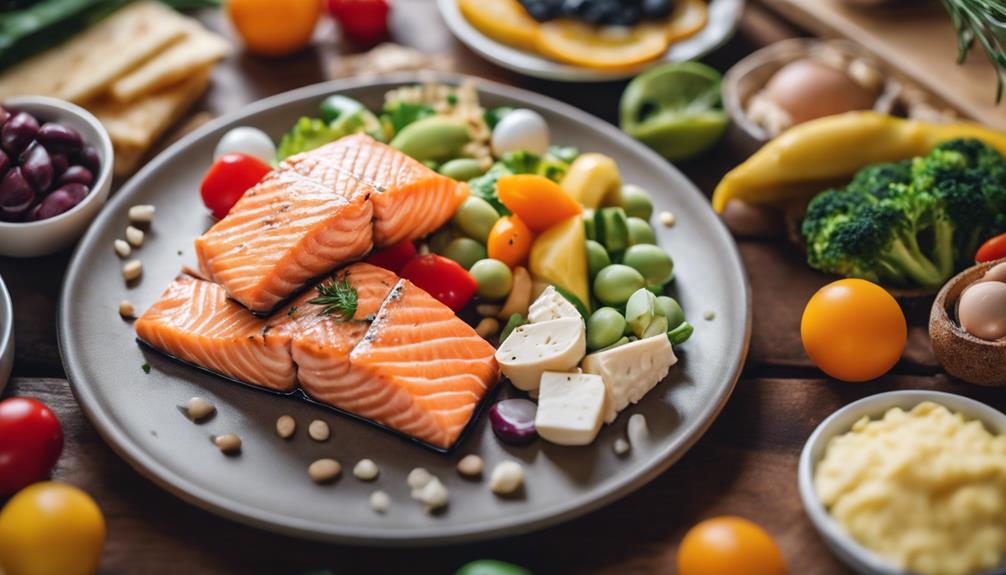
Vital proteins are important for your child's growing brain, providing essential nutrients like iron and zinc for cognitive development.
Options like lean beef support energy and concentration, while plant-based sources like black beans offer iron for brain health.
Including a variety of lean proteins in meals can help boost your child's learning abilities and prevent nutrient deficiencies that may impact brain function.
Essential Brain-Building Proteins
Beef and beans, as lean proteins, play an essential role in supporting the development of your baby's brain by providing essential nutrients like iron, zinc, and protein.
Incorporating these foods into your baby's diet is important for brain growth and cognitive development.
Here are some key points to keep in mind:
- Iron-rich beef supports energy and concentration in growing brains.
- Zinc in meat alternatives like beans aids in cognitive development.
- Lean proteins help prevent anemia and support healthy brain function, memory, and learning abilities.
Nutrient-Rich Fish Options
To further support your baby's brain development, consider incorporating nutrient-rich fish options into their diet as essential proteins for growing brains. Fatty fish such as salmon and tuna are packed with omega-3 fatty acids, particularly DHA, which are vital for brain function and intelligence.
By including fish in your child's meals, you can lower the risk of developmental issues and enhance their cognitive abilities. The omega-3 fatty acids found in fish support healthy brain growth and improve communication between brain cells, aiding in overall brain health for growing children.
These lean proteins not only provide essential nutrients but also contribute to your child's brain development. Including fish in their diet can have long-term benefits for their cognitive development and overall well-being.
Plant-Based Protein Sources
Consider incorporating nutrient-rich plant-based protein sources like beans and legumes into your child's diet to support their growing brain with essential nutrients such as zinc, iron, and folate. Here are some reasons why these foods are beneficial for your child's brain development:
- Beans and legumes provide a variety of essential nutrients important for brain health.
- These plant-based proteins are rich in fiber, antioxidants, and phytonutrients, all advantageous for brain function.
- Including a mix of plant-based and animal-based proteins promotes a well-rounded diet for excellent brain growth in babies and toddlers.
Yogurt: Brain-Boosting Benefits
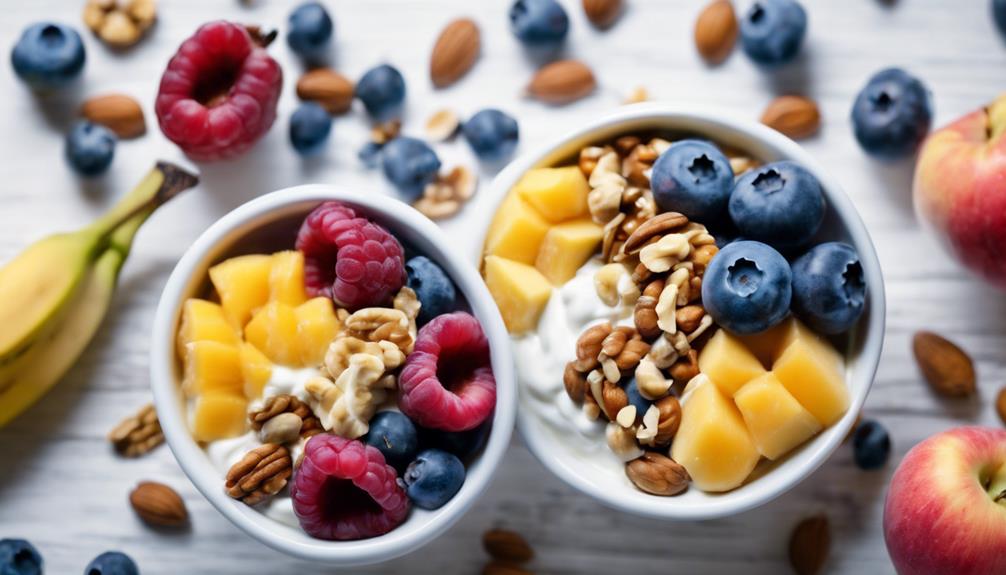
With its brain-boosting benefits, yogurt is a nutritious addition to your child's diet. Greek yogurt, in particular, is high in protein, providing essential nutrients that support brain development in babies. The protein content in yogurt aids in the growth and development of brain cells, important for your baby's cognitive function.
Additionally, yogurt contains probiotics that promote gut health, which is linked to improved brain function. Probiotics play a key role in supporting a healthy gut-brain connection, potentially enhancing your baby's overall brain health.
Moreover, yogurt is rich in vitamin B12, which is essential for neurotransmitter production. These neurotransmitters are important for proper brain function and can impact your baby's memory and cognitive abilities.
Nuts & Seeds: Smart Snacking

Enhance your child's brain development and overall health by incorporating nuts and seeds as smart snacking options in their diet. These tiny powerhouses are packed with nutrients that can benefit your child's cognitive abilities and brain function.
Here are a few reasons why nuts and seeds make excellent snacks for your little one:
- Nuts and seeds are a great source of iron, an essential mineral that supports brain development and overall health.
- They're rich in antioxidants and essential fatty acids, which can help improve memory, cognition, and communication between brain cells.
- Including nuts and seeds in your child's diet can provide certain nutrients that are vital for their growing brain, promoting ideal brain health and function.
Frequently Asked Questions
Which Food Increases Baby Brain Development?
To boost your baby's brain development, incorporate foods rich in choline, protein, B12, antioxidants, essential fatty acids, and omega-3s. Prioritize eggs, Greek yogurt, berries, nuts, seeds, and fatty fish like salmon for peak brain health and cognitive growth.
How to Increase IQ Level of Baby?
To increase your baby's IQ level, focus on a diet rich in nutrients like choline, iron, and omega-3. Introduce foods like eggs, seafood, and leafy greens early on. Nourishing your little one's brain can set them up for success.
How Can I Speed up My Baby's Brain Development?
To speed up your baby's brain development, include nutrient-rich foods like eggs, seafood, leafy greens, lean beef, and yogurt in their diet. These foods contain essential nutrients vital for cognitive function and memory, fostering healthy brain growth.
What Are the Top 5 Brain Foods?
You want to know the top 5 brain foods? Think of salmon swimming in omega-3s, eggs cracking with memory-boosting choline, Greek yogurt fueling brainpower, berries bursting with antioxidants, and nuts/seeds as brain's best friends.
Conclusion
To sum up, feeding your baby the right foods can help support their brain development and overall growth. Remember, eggs, seafood, leafy greens, lean proteins, yogurt, nuts, and seeds are all excellent choices to incorporate into your child's diet.
By providing a variety of nutrient-rich foods, you're setting them up for success. So, keep on feeding those little minds with the fuel they need to thrive and reach their full potential.
Feed their brains, feed their futures.

